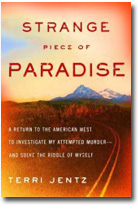Books |
Strange Piece of Paradise
Terri Jentz
By
Published: Jan 01, 2006
Category:
Non Fiction
Strange Piece of Paradise
Terri Jentz
In the spring of 1977, Terri Jentz was finishing her freshman year at Yale. Summer beckoned, and, with it, adventure — a cross-country bike ride with her roommate. Like Terri, Shayna Weiss (not her real name) had never undertaken a physical challenge this tough. Like Terri, Shayna had no fear of what they’d find along the route. But they were smart and resourceful and using well-traveled roads — what could go wrong?
Terri and Shayna took a bus to the West and started pedaling in Oregon on June 16. Seven days later, they were still in Oregon. As the day ended, their friendship was under strain. Worse, the guidebook said there was an overnight campground at Cline Falls State Park. But there wasn’t. And as they looked for a place to pitch their tent, they felt…watched. Should they press on to the next town?
They decided they were paranoid. But as a precaution, they decided to put their tent by the riverbank, where they wouldn’t be seen from the highway. And so they were alone, sleeping, when the pickup truck drove into the tent and stopped on Terri’s body. Alone when a man with a hatchet got out and hacked into Shayna’s head. Alone when he backed the truck up, stepped into the tent and slashed at Terri.
Shayna moans, dying. Terri pulls herself back "from the siren call of oblivion" and looks up at the torso of the man — a "cowboy…his shirt tucked meticulously into jeans so that not one wrinkle, not one bulge of fabric, mars the surface of his flat stomach." He’s holding the hatchet, but he’s not moving. "Please leave us alone," Terri says. "Take anything. Just leave us alone."
And…he leaves.
I’m not going to spill the details of what happens next, except to say that Terri — despite shredded flesh, a collapsed lung, a fractured collarbone, crushed rib cage, broken nose, chipped skull and a bone in her left forearm sliced clean through — does everything necessary to flag down a truck and get Shayna to a hospital. An astonishing display of courage and instinct and pure adrenalin. And, thanks to Terri, Shayna survives.
That near-murder was almost 30 years ago, but this account is fresher than today’s bread — every detail in place, every fact as precise as that cowboy’s tucked-in shirt. And the emotions are precisely delineated as well. How could that not be? After sitting on this experience for 15 years, Terri Jentz snapped awake in 1992 and began a painful reconstruction of her life. In essence, she became a cop.
The irony of her quest was not lost on her. Had she been killed, there would be no statute of limitations. But an unsolved attack in Oregon cannot be prosecuted after three years — and the police had failed to find a suspect who could be charged for the crime. So her quest is entirely personal. Unless, that is, her attacker is still out there, preying on other women.
But it’s more complex than that. Shayna is alive, but not at all the girl she was in 1977. Along with damaged eyesight, she’s had memory loss — she remembers nothing of the night on June 22. Married, with children, she sees no point in looking back, to wondering why, even to continuing her friendship with Terri. If Terri wants answers, she’s on her own.
Only she isn’t. As Terri reconstructs the attack and the investigation that follow, helpers appear — people she interviews become friends, parents of murdered women step forward. Soon the book takes on an inexorable, moral energy: Good may not defeat Evil, but Good is damn well going to identify it.
Evil. That’s the big idea at the core of this book. Oregon — and many of us — believe that criminals can be rehabilitated, that Society had a role in creating criminals and bears a share of the blame for what they do. Women who are victims of violent crimes know different. So do the parents of women and children who are targeted, raped and murdered.
So on one level, this is a whodunnit — Terri Jentz’s dogged search for her attacker. On another, it’s a psychological profile and biography of that man, and, by extension, of all men who somehow feel they have the right to beat, rape, torture and kill women. And, at the deepest level, it’s an exploration of violence in American life: our fascination with crime, our lack of identification with its victims, our shrug-of-the-shoulders attitude toward justice.
A book that will anger you? No fooling. At one point, I wished that every woman in this country had a gun and gun training, the better to cap any man who looks sideways at her — like America needs another gun! At another, I decided the death penalty for sex-based crimes against women would be a good solution — like cops and prosecutors never make mistakes. Finally, I was left with questions: What is it that makes America the most violent nation in the West? Where will this lead? What could change it?
The power of "Strange Piece of Paradise" is that it keeps these thoughts running on a parallel track in your head as you read a riveting tale of crime and accountability. It’s non-fiction Dostoevsky, and deserving of all the praise it has received. On the other hand, the book is 535 pages long. I could have cut 150 pages and you’d miss nothing. But then I notice that verb, and I feel quite sure that Terri Jentz’s editor, a man, felt he could "cut" very little, if anything. Because if anyone has earned the right to tell her story, at length, it is Terri Jentz.
To buy "Strange Piece of Paradise" from Amazon.com, click here.


